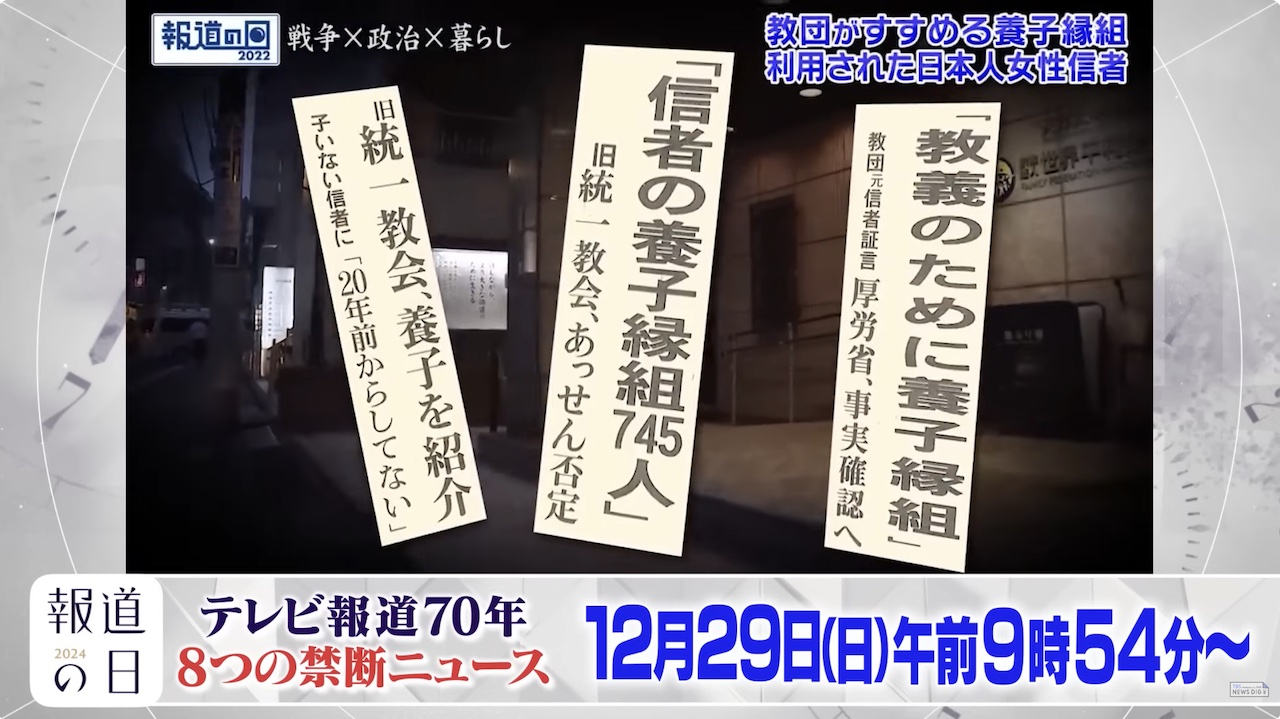TOKYO, Dec 28 (News On Japan) - The shadowy practices of the former Unification Church, involving Japanese female members, have come under scrutiny in recent months. From forced adoptions to missionary assignments and massive financial contributions, these practices highlight the harsh realities faced by these women.
The controversial adoption practices of the church came to light in November, revealing a doctrinal foundation that emphasizes childbearing and family as central to attaining God's kingdom. According to church teachings, children are indispensable in building a God-centered family. As a result, female members were often pressured to offer their children for adoption to families within the church who were unable to have children. A former member noted, "Childbearing is viewed as a blessing and central to fulfilling one's role as a woman in the church." This pressure extended beyond reproduction; women were sent across the world to evangelize, often under harsh conditions. Many Japanese women were dispatched globally as part of the church’s efforts, enduring years of grueling missionary work.
In the late 1970s, allegations of abuse surfaced when a former member in South Korea, a close associate of the church’s leader, sought to revoke the group’s status as a Christian organization. Though the petition was unsuccessful, it exposed troubling incidents, including inappropriate relationships between male leaders and female members. A former Japanese member explained, "We were taught to follow our leader’s directives without question, including participating in activities that defied common sense."
By the 1990s, the church shifted its strategy from anti-communist activism to promoting world peace. This included founding the Women’s Federation for World Peace in 1992, which heavily relied on Japanese female members. They were called to attend training sessions in South Korea, where they were reportedly required to donate significant sums of money—amounting to 1 million yen or $10,000 per person. The church claimed over 160,000 participants in these sessions, but repeated attendance inflated the financial burden on members. One member revealed, "The church called it a donation, but it was a coercive demand. Some women paid millions of yen over multiple sessions."
In 1996, Japanese women were sent to Uruguay as part of a plan to establish the country as a "model nation" for the church. Over 4,000 Japanese women gathered in a gymnasium there, with the church’s leader providing encouragement. Uruguay was chosen due to its geographic position opposite South Korea, which the church saw as a divine connection. The women’s role extended beyond missionary work. They were involved in financial transactions, reportedly carrying large sums of cash to banks. One former member described seeing women with "gift-like bags filled with cash" that were deposited into church-controlled accounts. On one occasion, $19 million was deposited in a single day.
The forced deployment of women overseas had a devastating impact on families. Husbands and children left behind struggled with the absence of mothers, often during crucial developmental years. A former member recounted, "My wife left when our children were young, and it deeply affected their emotional growth."
One of the most harrowing aspects involved women offering their own children for adoption to other church families. A Japanese woman who bore five children decided to give her fifth child for adoption, a decision that later contributed to her declining health and eventual death. The church’s leader reportedly stated, "There is nothing more shameful than being unable to bear children." Women were summoned to headquarters and persuaded to offer their children to others in the congregation. Those who agreed raised their hands in acceptance during group sessions.
The Women’s Federation for World Peace, celebrated for its charitable work and recognized by the United Nations as an NGO, has a troubling history of exploiting its members. For decades, Japanese women bore the burden of childbearing, missionary work, and financial contributions, often at great personal and familial cost.
Source: TBS














